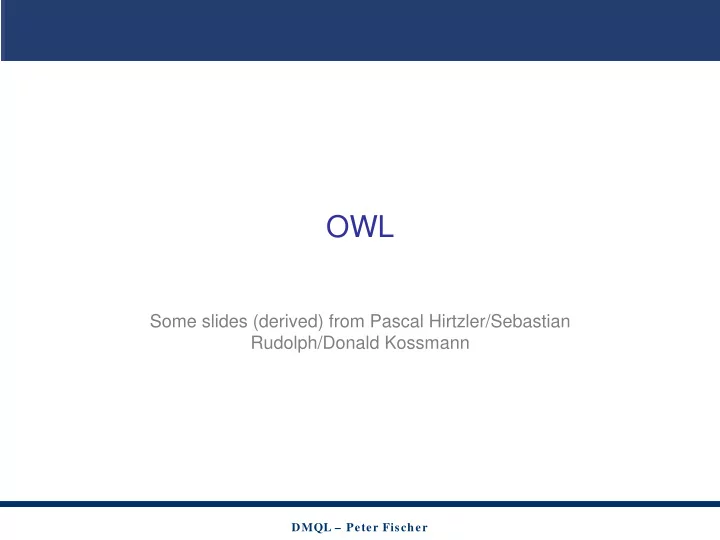

OWL Some slides (derived) from Pascal Hirtzler/Sebastian Rudolph/Donald Kossmann DMQL – Peter Fischer
Today: OWL Syntax 2 DMQL – Peter Fischer
Ontologies „ A specification of a conceptualization “ • • Ontologies describe a domain: – Declarative and explicit – Give all concepts (classes) – Give all properties (attributes, relationships) – Constraints on properties – Give individuals 3 3 DMQL – Peter Fischer
Benefits of Ontologies Shared vocabulary (for humans and agents) • • Shared common understanding of the structure of information • Reuse of domain knowledge – Avoid re-inventing the wheel – Establish standards 4 4 DMQL – Peter Fischer
Benefits of Ontologies (ctd) • Assumptions become explicit – Explain assumptions – Change assumptions – Hypothetical reasoning (multiple scenarios) – Support for evolving systems where time and situations change necessitating re-evaluation of assumptions – Support for interoperation with other (legacy) systems • Separation of types of knowledge – Declarative domain knowledge vs. procedural knowledge – Background knowledge (unchanging meta-data) from changing information – Authoritative vs. other … 5 5 DMQL – Peter Fischer
Example: subClasses • Subclass inherits all slots from superclass • Subclass can add constraints to “narrow” the list of allowed values – Make the cardinality range smaller – Replace a class in the range with a subclass hasMaker Wine Winery is-a is-a French hasMaker French wine winery 6 6 DMQL – Peter Fischer
Example: Synonyms • Synonym names for the same concept are not different classes Many systems allow listing synonyms as part of the class • definition OWL allows defining necessary and sufficient conditional • definitions thereby allowing synonym definitions to be “first class” terms 7 7 DMQL – Peter Fischer
Use Case: Web Portals Describe terminology for a community Enable powerful search Enable uniformed publishing of data Examples: OntoWeb: www.ontoweb.org The Open Directory: www.dmoz.org 8 8 DMQL – Peter Fischer
Use Case: Multimedia Data • Specify meta-data for images, music, etc. Specify constraints on that data • – E.g., Late Gregorian -> Britain, 1760-1811 • Makes search more powerful (inference) – Look for „Late Gregorian“ if interest in Britain Further Use Cases: • – Ad-hoc networks: e.g., Jini, UPnP – Design documentation for engineering 9 9 DMQL – Peter Fischer
Requirements for Ontologies • Instantiation of classes by „Individuals“ • Hierarchies of concepts (taxonomies, „inheritance“): • Classes, concepts • Binary relationships among individuals: Properties, Roles • Properties of relationships (e.g. range, transitive) • Data types (e.g. numbers): concrete domains 10 DMQL – Peter Fischer
RDF Schema as Ontology Language Useful for simple Ontologies • • Pro: reasoning/entailment fairly efficient • Con: not suitable for complex modeling • Need for more languages: OWL 11 DMQL – Peter Fischer
Species of OWL OWL Lite: simple constraints and classification hierarchy • • OWL DL: maximum expressiveness without losing computation completeness • OWL Full: maximum expressiveness and full RDF syntactic freedom, but no computation guarantees (might specify undeciable rules) • N.B. RDFS subset of OWL Full! 12 12 DMQL – Peter Fischer
OWL Documents Are “normal“ RDF documents consisting of • – Header – Actual ontology 13 DMQL – Peter Fischer
OWL Header (1) Define all namespaces at root node <rdf:RDF xmlns ="http://www.semanticweb- grundlagen.de/beispielontologie#" xmlns:rdf ="http://www.w3.org/1999/02/22-rdf-syntax-ns#" xmlns:xsd ="http://www.w3.org/2001/XMLSchema#" xmlns:rdfs ="http://www.w3.org/2000/01/rdf-schema#" xmlns:owl ="http://www.w3.org/2002/07/owl#"> ... </rdf:RDF> 14 DMQL – Peter Fischer
OWL Header (2) General Information <owl:Ontology rdf:about=""> <rdfs:comment rdf:datatype="http://www.w3.org/2001/XMLSchema#string“> SWRC Ontologie in der Version vom Dezember 2005 </rdfs:comment> <owl:versionInfo>v0.5</owl:versionInfo> <owl:imports rdf:resource="http://www.semanticweb- grundlagen.de/foo"/> <owl:priorVersion rdf:resource="http://ontoware.org/projects/swrc"/> </owl:Ontology> 15 DMQL – Peter Fischer
OWL Header - properties Inherited from RDFS • – rdfs:comment – rdfs:label – rdfs:seeAlso – rdfs:isDefinedBy Versioning • – owl:versionInfo – owl:priorVersion – owl:backwardCompatibleWith – owl:incompatibleWith – owl:DeprecatedClass – owl:DeprecatedProperty • Others – owl:imports 16 DMQL – Peter Fischer
Classes, Roles and Indiviuals The three building blocks of ontologies: 1. Classes Similar to classes in RDFS 2. Individuals Similar to objects in RDFS 3. Roles Similar to properties in RDFS 17 DMQL – Peter Fischer
Classes Definition <owl:Class rdf:ID="Professor"/> predefined • owl:Thing • owl:Nothing 18 DMQL – Peter Fischer
Individuals Definition by membership in a class <rdf:Description rdf:ID="RudiStuder"> <rdf:type rdf:resource="#Professor"/> </rdf:Description> Same as <Professor rdf:ID="RudiStuder"/> 19 DMQL – Peter Fischer
Abstract Roles Defined the same way as classes <owl:ObjectProperty rdf:ID="Zugehoerigkeit"/> Domain and Range of abstract roles <owl:ObjectProperty rdf:ID="Zugehoerigkeit"> < rdfs:domain rdf:resource="#Person"/> < rdfs:range rdf:resource="#Organisation"/> </owl:ObjectProperty> 20 DMQL – Peter Fischer
Concrete Roles Concrete roles have datatypes as range <owl:DatatypeProperty rdf:ID="Vorname"/> Domain and Range of concrete roles <owl:DatatypeProperty rdf:ID="Vorname"> < rdfs:domain rdf:resource="#Person" /> < rdfs:range rdf:resource="&xsd;string"/> </owl:DatatypeProperty> Many XML Schema data types possible, integer and string mandatory 21 DMQL – Peter Fischer
Individuals and Roles <Person rdf:ID="RudiStuder"> <Zugehoerigkeit rdf:resource="#AIFB"/> <Zugehoerigkeit rdf:resource="#ontoprise"/> <Vorname rdf:datatype="&xsd;string">Rudi</Vorname> </Person> Roles are typically not functional (see later!) 22 DMQL – Peter Fischer
Simple relationships among classes <owl:Class rdf:ID="Professor"> < rdfs:subClassOf rdf:resource="#Fakultaetsmitglied"/> </owl:Class> <owl:Class rdf:ID="Fakultaetsmitglied"> < rdfs:subClassOf rdf:resource="#Person"/> </owl:Class> We can now infer that Professor is a subclass of Person 23 DMQL – Peter Fischer
Simple relationships among classes <owl:Class rdf:ID="Professor"> <rdfs:subClassOf rdf:resource="#Fakultaetsmitglied"/> </owl:Class> <owl:Class rdf:ID=“Buch"> <rdfs:subClassOf rdf:resource="#Publication"/> </owl:Class> <owl:Class rdf:about="#Fakultaetsmitglied"> < owl:disjointWith rdf:resource="#Publikation"/> </owl:Class> We can now infer that Professor and Book are also disjoint 24 DMQL – Peter Fischer
Simple relationships among classes <owl:Class rdf:ID="Buch"> <rdfs:subClassOf rdf:resource="#Publikation"/> </owl:Class> <owl:Class rdf:about="#Publikation"> < owl:equivalentClass rdf:resource="#Publication"/> </owl:Class> We can now infer that Buch is a subclass of Publication 25 DMQL – Peter Fischer
Individuals and Class Relationships <Buch rdf:ID="SemanticWebGrundlagen"> <Autor rdf:resource="#PascalHitzler"/> <Autor rdf:resource="#MarkusKrötzsch"/> <Autor rdf:resource="#SebastianRudolph"/> <Autor rdf:resource="#YorkSure"/> </Buch> <owl:Class rdf:about="#Buch"> <rdfs:subClassOf rdf:resource="#Publikation"/> </owl:Class> We can now infer that SemantikWebGrundlagen is of type Publication 26 DMQL – Peter Fischer
Relationships among individuals <Professor rdf:ID="RudiStuder"/> <rdf:Description rdf:about="#RudiStuder"> < owl:sameAs rdf:resource="#ProfessorStuder"/> </rdf:Description> We can now infer that ProfessorStuder is a Professor Different of individuals via owl:differentFrom 27 DMQL – Peter Fischer
Relationships among individuals <owl:AllDifferent> <owl:distinctMembers rdf:parseType="Collection"> <Person rdf:about="#RudiStuder"/> <Person rdf:about="#YorkSure"/> <Person rdf:about="#PascalHitzler"/> </owl:distinctMembers> </owl:AllDifferent> • Shorthand for multiple owl:differentFrom 28 DMQL – Peter Fischer
Recommend
More recommend